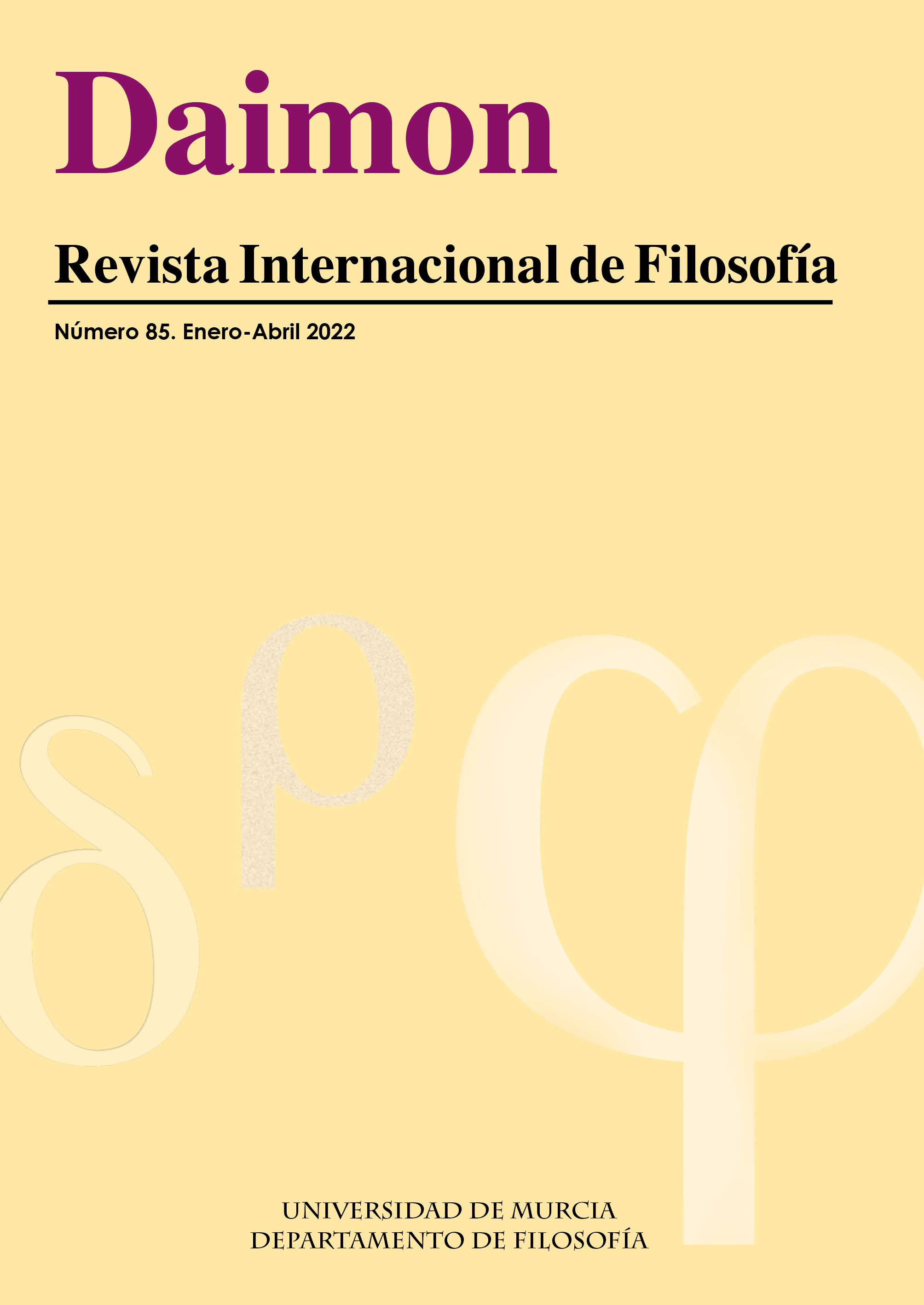El concepto de muerte como paradoja en la vía del conocimiento absoluto en la filosofía de F.W.J. Schelling
Abstract
We’ll try to analyze the concept of death in various parts of Schelling’s philosophy, with special emphasis on the Stuttgarter Privatvorlesungen to establish that the philosopher uses this concept with different meanings, which leads him to encompass the perspective of essence and of the entity as areas of death always that they are considered isolated. There must be between these two parameters a mediating instance that connects these immeasurable scopes, which is in this case the apophantic character of verb. This mediation is what dissolves death and what introduces life into the space left by the first two reciprocal segments.
Downloads
-
Abstract897
-
PDF (Español (España))767
-
HTML (Español (España))251
References
Fuentes primarias de Schelling
Schelling, F. W. J.; Schellings Werke, (Schröter, M., Hg.), C. H. Beck/ R. Oldenburg, 1966, München.
Fuentes primarias
Aristóteles, Metafísica, Gredos, 1994, Madrid.
Fuentes secundarias
Brandner, R.; Natur und Subjektivität. Zur Verständnis des Menschseins im Anschluβ an Schellings Grundlegung der Naturphilosophie, Königshausen & Neumann, 2002, Würzburg.
Brito, E.; La création selon Schelling, Leuven University Press, 1987, Louvain.
Cardona Suárez, L. F.; Inversión de los principios. La relación entre libertad y mal en Schelling, Comares, 2002, Granada.
Cardona Suárez, L. F. en "La metafísica schellingniana del Yo absoluto como una «ética a lo Spinoza»", en Universitas Philosophica, 57, 2011, Bogotá, pp. 87-122.
Carrasco Conde, A.; “Decisión y elección o la afilada sección del instante. La libertad en Schelling y la influencia de Kant en el Freitheitsschrift”, en Daímon. Revista Internacional de Filosofía 2, 2008, pp. 347-354.
Carrasco Conde, A., "Ens alienum. El mal desde la Naturphilosophie en F.W.J. Schelling", en El vuelo del búho: estudios sobre filosofía del Idealismo, Del Luján di Sanza, S. y López, D. M. (eds.), Prometeo, 2014, Buenos Aires, pp. 241-266.
Courtine, J.-F.; Extase de la raison. Essais sur Schelling, Galilée, 1990, Paris.
Danz, Ch.; Die philosophische Christologie F. W. J. Schellings, Frommann-Holzboog, Schellingiana, Band 9, 1996, Stuttgart-Bad Cannstatt.
Duque, F.; “Schelling. La naturaleza ̶ en Dios, o los problemas de un guion”, en Daimon. Revista de filosofía, nº 40, 2007, pp. 7-27.
Esposito, J. L.; Schelling's Idealism and Philosophy of Nature, Associated University Presses, 1977, New Jersey.
Freydberg, B.; Schelling's Dialogical Freedom Essay, SUNY, 2008, New York.
Gérard, G.; "L'absolu et la question de l'homme dans les Lettres philosophiques sur le dogmatisme et le criticisme de Schelling", en Études d'anthropologie philosophique, Florival, G. (Ed.), Éditions de l'institut supérieur de philosophie, 1984, Louvain-la-Neuve, pp. 116-155.
Hamilton Grant, I.; "«Philosophy become genetic»: The Physics of the World Soul", en The new Schelling, Norman, J. y Welchman, A. (eds.), Continuum, 2004, London, pp. 128-150.
Hatem, J.; "Dieu comme personne dans la philosophie de Schelling: la Réponse a Eschenmayer constamment rapportée au Traité sur la liberté", en Annales de Philosophie, Vol. 7, 1986, Beyrouth, pp. 27-57.
Hogrebe, W. en Prädikation und Genesis. Metaphysik als Fundamentalheuristik im Ausgang von Schellings »Die Weltalter«, Suhrkamp, 1989, Frankfurt am Main.
Kasper, W.; Das Absolute in der Geschichte. Philosophy und Theologie der Geschichte in der Spätphilosophie Schellings, Matthias-Grünewald, 1965, Mainz.
Leyte, A.; "Schelling: una biología teológica", en Los filósofos y la biología. Thémata: revista de filosofía, Núm. 20, 1998, pp. 89-106.
Maesschalck, M., Philosophie et révélation dans l'itinéraire de Schelling, Éditions de l’institut supérieur de philosophie Louvain-la-neuve, Éditions Peeters, 1989, Leuven.
Pérez-Borbujo en “Schelling y la metafísica de la voluntad”, en Contrastes. Revista Internacional de Filosofía, vol. XVII, Málaga, 2012, pp. 229-246.
Popa, D.; "La difficile communauté des libertés. Droit et résistance chez Fichte et Schelling en 1796-1797", en Les carnets du centre de philosophie du droit, nº 149, Université Catholique de Louvain, Louvain-la-Neuve, 2010, pp. 3-25.
Rosenau, H.; "Essentifikation. Die theonome Existenz des Menschen in Schellings Spätphilosophie", en Schellings philosophische Anthropologie, 2002, Stuttgart-Bad Cannstatt, pp. 51-74.
Schulz, W.; Die Vollendung des deutschen Idealismus in der Spätphilosophie Schellings, W. Kohlhammer Verlag, 1955, Stuttgart.
Schulze, W. A.; "Gott und Mensch. Zwei Studien zum deutschen Idealismus", en Theologische Zeitschrift, 11, 1955, pp. 426-436.
Tilliette, X.; Schelling. Une Philosophie en Devenir. La Dernière Philosophie 1821-1854, Vol. II, Vrin, 1970, Paris.
Tillich, P.; Mystik und Schuldbewuβtsein in Schellings philosophischer Entwicklung, en Frühe Hauptwerke. Gesammelte Werke, Band I, Evangelisches Verlagswerk, 1959, Stuttgart.
Vetö, M.; "Philosophie de l'existence et théisme scientifique. Perspectives du système schellingien", en Annales de Philosophie, Vol. 24, 2003, Beyrouth, pp. 41-58.
Wieland, W.; Schellings Lehre von der Zeit, Carl Winter, 1956, Heidelberg.
Las obras que se publican en esta revista están sujetas a los siguientes términos:
1. El Servicio de Publicaciones de la Universidad de Murcia (la editorial) conserva los derechos patrimoniales (copyright) de las obras publicadas, y favorece y permite la reutilización de las mismas bajo la licencia de uso indicada en el punto 2.
2. Las obras se publican en la edición electrónica de la revista bajo una licencia Creative Commons Reconocimiento-NoComercial-SinObraDerivada 3.0 España (texto legal). Se pueden copiar, usar, difundir, transmitir y exponer públicamente, siempre que: i) se cite la autoría y la fuente original de su publicación (revista, editorial y URL de la obra); ii) no se usen para fines comerciales; iii) si remezcla, transforma o crea a partir del material, no podrá distribuir el material modificado.
3. Condiciones de auto-archivo. Se permite y se anima a los autores a difundir electrónicamente las versiones pre-print (versión antes de ser evaluada) y/o post-print (versión evaluada y aceptada para su publicación) de sus obras antes de su publicación, ya que favorece su circulación y difusión más temprana y con ello un posible aumento en su citación y alcance entre la comunidad académica. Color RoMEO: verde.











